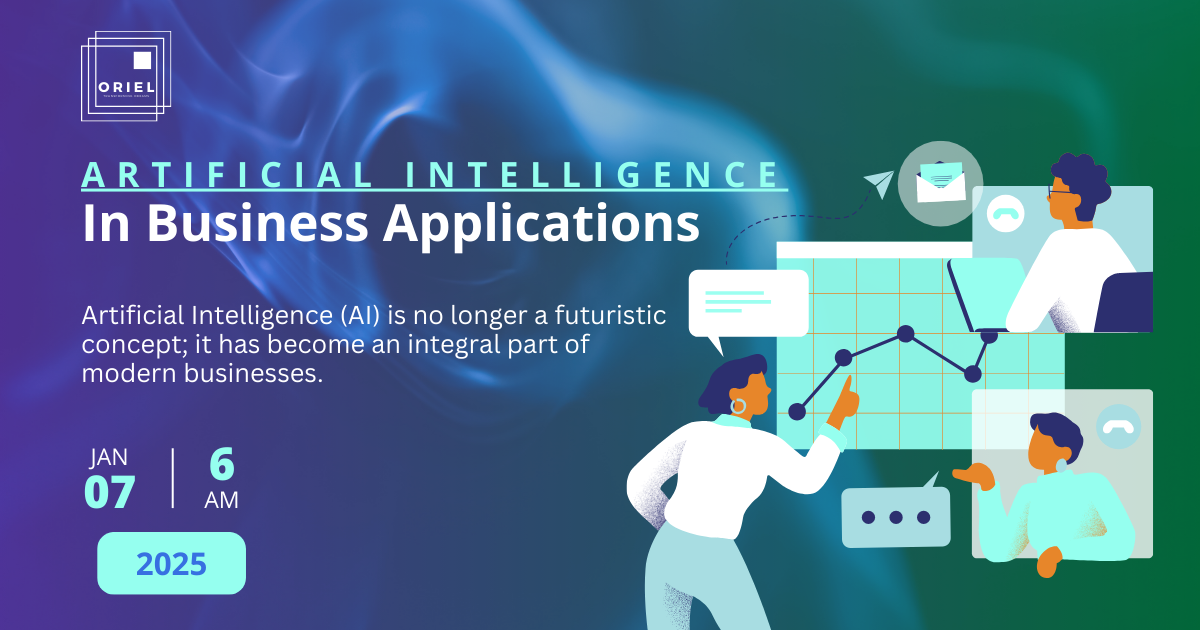Artificial Intelligence in Business Applications: Revolutionizing the Corporate World
Artificial Intelligence (AI) is no longer a futuristic concept; it has become an integral part of modern businesses. From automating mundane tasks to delivering data-driven insights, AI is revolutionizing how companies operate. As organizations aim to stay competitive in a rapidly evolving landscape, leveraging AI in business applications has become essential. Artificial Intelligence (AI) in business applications is transforming how organizations operate. From automating workflows to delivering data-driven insights, AI is revolutionizing industries worldwide.
In this blog, we will explore the various applications of AI in business, its benefits, challenges, and the industries that are being transformed by this groundbreaking technology.
Why AI is Essential in Modern Businesses
Businesses generate and process vast amounts of data daily. AI empowers companies to:
- Streamline Operations: Automating repetitive tasks and workflows.
- Enhance Decision-Making: Providing actionable insights from data.
- Improve Customer Experiences: Personalizing interactions and services.
- Reduce Costs: Optimizing resources and minimizing inefficiencies.
Moreover, with AI’s ability to learn and improve over time, businesses can adapt to changing market demands with unprecedented agility. The incorporation of AI into business processes is no longer a luxury—it’s a necessity for staying ahead in a competitive landscape.
Key Applications of AI in Business

1. Automation and Workflow Optimization
AI-powered tools are automating repetitive tasks, allowing employees to focus on strategic activities.
- Examples:
- Robotic Process Automation (RPA) for automating data entry, invoicing, and document processing.
- AI chatbots for handling customer inquiries around the clock.
- Real-World Case: A multinational company reduced its invoice processing time by 85% using an AI-driven RPA solution.
2. AI in Marketing and Sales
AI is revolutionizing how businesses understand and engage with their customers.
- Applications:
- Predictive analytics for identifying customer behavior trends and preferences.
- Personalization engines that deliver tailored marketing messages based on customer data.
- AI-powered CRM platforms like Salesforce Einstein for better lead management.
- Benefits:
- Higher conversion rates due to personalized campaigns.
- Improved customer satisfaction through targeted communication.
- Real-World Case: Netflix uses AI to recommend content based on viewing history, improving user engagement and retention.
3. Data Analytics and Insights
AI enables businesses to analyze large datasets and extract actionable insights faster than ever before.
- Applications:
- Forecasting sales and market trends with machine learning algorithms.
- AI-driven tools like Tableau and Power BI for data visualization.
- Sentiment analysis of customer feedback to improve products and services.
- Benefits:
- Better decision-making based on data-driven insights.
- Identification of new revenue streams and market opportunities.
- Real-World Case: Amazon uses AI to optimize its supply chain by analyzing customer demand patterns.
4. Customer Service
AI is transforming customer support by making it faster, more efficient, and more personalized.
- Applications:
- Virtual assistants like chatbots that resolve common queries instantly.
- Sentiment analysis tools that identify and address customer concerns proactively.
- Benefits:
- Reduced response times.
- Consistent and high-quality customer service.
- Real-World Case: Bank of America’s AI-driven chatbot, Erica, has handled over 100 million customer interactions, saving time and resources.
5. AI in Human Resources
AI is streamlining recruitment, employee engagement, and talent management processes.
- Applications:
- Recruitment tools that analyze resumes and shortlist candidates based on job requirements.
- AI platforms like Workday that provide workforce analytics to improve employee engagement.
- Chatbots for onboarding new employees and answering HR-related questions.
- Benefits:
- Faster and more efficient hiring processes.
- Enhanced employee satisfaction through personalized career development plans.
6. Supply Chain and Inventory Management
AI helps optimize supply chains and manage inventory levels more effectively.
- Applications:
- Predictive analytics to anticipate demand and adjust stock levels accordingly.
- AI-powered logistics platforms that optimize delivery routes to save time and fuel costs.
- Benefits:
- Cost savings from efficient inventory management.
- Reduced delivery times and improved customer satisfaction.
- Real-World Case: DHL uses AI to optimize its supply chain, reducing costs and improving delivery accuracy.
7. Fraud Detection and Cybersecurity
AI is enhancing security by detecting and preventing fraudulent activities in real time.
- Applications:
- AI-powered systems for detecting unusual patterns in financial transactions.
- Predictive algorithms to identify potential security breaches before they occur.
- Benefits:
- Improved trust among customers.
- Reduced financial losses due to fraud.
- Real-World Case: PayPal uses AI to monitor millions of transactions daily, identifying fraudulent activities with high accuracy.
Industries Being Transformed by AI
1. Retail
AI is enabling personalized shopping experiences and efficient inventory management. Retailers are using AI to analyze customer data and optimize their supply chains.
2. Healthcare
From diagnosing diseases to streamlining administrative tasks, AI is revolutionizing healthcare delivery. Tools like IBM Watson Health are helping doctors make better decisions.
3. Finance
AI is driving fraud detection, risk assessment, and algorithmic trading in the financial sector. Tools like Zest AI help banks make data-driven lending decisions.
4. Manufacturing
AI-powered robotics and predictive maintenance are improving production efficiency and reducing downtime.
5. Education
AI is personalizing learning experiences and automating administrative processes in educational institutions. Platforms like Coursera and Duolingo use AI to deliver customized learning paths.
Benefits of AI in Business
AI offers a myriad of benefits that are transforming how businesses operate:
- Enhanced Productivity: By automating mundane tasks, employees can focus on creative and strategic activities.
- Cost Savings: AI reduces operational costs by optimizing processes and eliminating inefficiencies.
- Improved Accuracy: AI minimizes human errors, ensuring more reliable outcomes.
- Better Decision-Making: AI-powered insights help businesses make informed and data-driven decisions.
- Scalability: AI tools are scalable, enabling businesses of all sizes to leverage their capabilities.
Challenges in Adopting AI in Business
While AI offers numerous benefits, its adoption comes with challenges:
- Cost of Implementation: AI tools and technologies can be expensive for small businesses.
- Data Privacy Concerns: Handling sensitive data requires robust security measures.
- Skill Gap: The lack of skilled professionals to manage and deploy AI systems.
- Ethical Considerations: Ensuring AI systems are free from biases and align with ethical standards.
- Integration Issues: Businesses may face challenges integrating AI into existing workflows and systems.
Future Trends in AI for Business Applications
The future of AI in business is promising. Emerging trends include:
- Hyper-Automation: Combining AI with RPA to automate end-to-end business processes.
- Edge AI: AI running on local devices for real-time insights without relying on the cloud.
- AI and IoT Integration: Enhancing smart devices with AI capabilities to create intelligent systems.
- AI in Sustainability: Helping businesses optimize resource usage and reduce carbon footprints.
- Ethical AI Development: Emphasis on creating transparent, unbiased, and accountable AI systems.
FAQs About Artificial Intelligence in Business Applications
1. What is artificial intelligence in business applications, and why is it important?
Artificial intelligence in business applications refers to the use of advanced technologies to optimize workflows, automate tasks, and enhance decision-making. It is important because it enables businesses to increase efficiency, reduce costs, and deliver personalized customer experiences.
2. How do businesses benefit from artificial intelligence in business applications?
Businesses benefit from artificial intelligence in business applications by automating repetitive tasks, improving data analysis, and enhancing customer service. Artificial intelligence-powered tools like chatbots and predictive analytics help companies save time, cut costs, and make data-driven decisions.
3. What are the top examples of artificial intelligence in business applications?
Some top examples of artificial intelligence in business applications include:
- Chatbots for automating customer support.
- Predictive analytics for sales forecasting.
- Robotic Process Automation (RPA) for data entry and workflow automation. These tools are transforming industries by streamlining processes and improving accuracy.
4. Is artificial intelligence in business applications suitable for small businesses?
Yes, artificial intelligence in business applications is highly suitable for small businesses. Affordable artificial intelligence tools like chatbots for customer interactions and AI-powered CRMs enable small businesses to compete with larger enterprises by improving efficiency and customer satisfaction.
5. How is artificial intelligence in business applications used in marketing?
Artificial intelligence in business applications is revolutionizing marketing by analyzing customer data, creating personalized campaigns, and optimizing ad placements. Tools like AI-powered recommendation engines improve engagement and increase conversion rates.
6. What industries are adopting artificial intelligence in business applications the most?
Industries such as retail, healthcare, finance, manufacturing, and education are rapidly adopting artificial intelligence in business applications. For instance:
- Retail uses artificial intelligence for inventory management.
- Healthcare applies artificial intelligence for diagnostics.
- Finance leverages artificial intelligence for fraud detection and risk analysis.
7. What are the challenges of implementing artificial intelligence in business applications?
Implementing artificial intelligence in business applications comes with challenges such as:
- High Costs: Initial setup can be expensive.
- Data Privacy Issues: Ensuring customer data is secure.
- Skill Gaps: Training employees to use artificial intelligence effectively. Despite these challenges, the benefits of artificial intelligence outweigh the drawbacks for most businesses.
8. How can businesses ensure ethical use of artificial intelligence in business applications?
Businesses can ensure ethical use of artificial intelligence in business applications by adopting transparent systems, minimizing biases in algorithms, and regularly auditing artificial intelligence processes. Ethical practices build trust among customers and stakeholders.
9. How does artificial intelligence in business applications improve customer service?
Artificial intelligence in business applications improves customer service by using tools like chatbots, virtual assistants, and sentiment analysis. These tools offer faster response times, personalized solutions, and a consistent customer experience.
10. What are the future trends in artificial intelligence in business applications?
Future trends in artificial intelligence in business applications include:
Edge Artificial Intelligence: Real-time processing without relying on cloud services. These trends will further enhance the role of artificial intelligence in transforming businesses.
Hyper-Personalization: Artificial intelligence will tailor customer experiences more effectively.
AI-Powered Automation: End-to-end automation across industries.
Conclusion
AI in business applications is not just a trend—it’s a necessity for organizations aiming to thrive in a competitive environment. By automating processes, enhancing customer experiences, and providing actionable insights, AI is transforming the corporate world. However, businesses must address the challenges and implement AI responsibly to fully harness its potential.
Are you ready to integrate AI into your business? Explore the possibilities and take your organization to the next level with AI-driven solutions.
Learn more about AI in business applications here.
Top AI Tools for 2025: Revolutionizing Industries with AI Innovation

